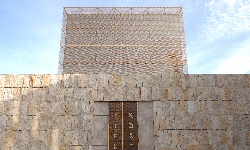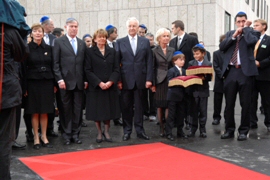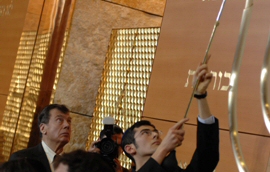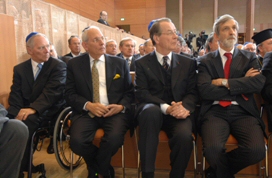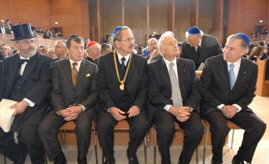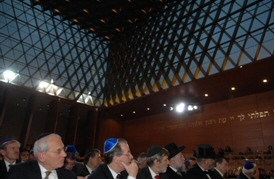In the presence of world Jewish leaders lead by WJC Edgar M. Bronfman and top representatives of the German state, Munich has celebrated the inauguration of a new Ohel Jakob synagogue and community center, which now forms Europe's largest Jewish center. On the day of 68th anniversary of the so-called "Kristallnacht" of 9 November 1938, when synagogue's across Germany were destroyed by a Nazi-orchestrated campaign, Charlotte Knobloch, president of the Central Council of Jews and of Munich's Jewish community, declared: "This building shows that we Jews are again part of German society...Today, we can show the entire world that Hitler did not succeed in annihilating us. There are Jews in the former capital of the Nazi movement." Earlier, Knobloch handed the key to this new synagogue to a boy, saying that on Kristallnachtshe had been the same age as he is now. "The circle has been closed", she said.
"This synagogue is not just a trial, it is a hope. It is a place of hope, that there will not be a repetition," Israel Singer, chairman of the Policy Council of the World Jewish Congress, pointed out. He called the treatment of Jews a test for the health of Germany's democracy. German president Horst Köhler said that it was "the duty of each and every one of us to get involved and act to prevent people being abused, injured or even murdered due to their religion, origin or appearance."
At the ceremony, Edgar M. Bronfman lighted the two menorahs. In a festive procession, several Torah scrolls were carried from the old synagogue in Reichenbachstraße to the new building. The event was broadcast live on national German television.
Yet looming over the festivities were shadows of the past, a day after a new study found that right-wing extremism persists in Germany, with 26.7 per cent harboring anti-foreigner views. Some 8.4 per cent of the 4,900 people polled by the University of Leipzig held anti-Semitic views, in Bavaria, it is every sixth person.
